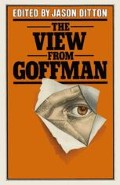Abstract
As a writer, Erving Goffman operates on many different levels. The variety of interpretations he has received — no two of them alike — makes us suppose that his analyses, or his capacities for presenting himself, are endlessly varied and not to be categorised. Throughout his work he has toyed with the relativistic gambit of social reality-constructing, although usually in tandem with assertions about the bedrock of social rules and obligations. One is tempted to find the larger frame of endless alternation between these views more compelling than the Durkheimian determinism lodged within.
Access this chapter
Tax calculation will be finalised at checkout
Purchases are for personal use only
Preview
Unable to display preview. Download preview PDF.
Chapter Endnotes
Kai T. Erikson, Wayward Puritans, (J. Wiley and Sons; New York, 1966 ).
Claude Lévi-Strauss, Les Structures Elementaires de la Parenté, (Paris; Presses Universitaires de France, 1949). [Trans.: The Elementary Structures of Kinship, (New York; Beacon Press, 1969)].
Basil Bernstein, Class, Codes, and Control, ( London; Routledge and Kegan Paul, 1971 ).
Mary Douglas,Natural Symbols, (Harmondsworth; Pelican, 1973).
Randall Collins, Conflict Sociology, ( New York; Academic Press, 1975 ), pp. 67–79.
Bernstein ibid., and Pierre Bourdieu, Esquisse d’une Théorie de la Pratique, (Paris; Librairie Droz, 1972). [Trans.: Outline of a Theory of Practice (Cambridge; Cambridge University Press, 1977)].
W. Lloyd Warner, The Living and the Dead, (Princetown; Yale University Press, 1959).
Collected in Everett C. Hughes, Men and Their Work, (New York; Free Press, 1958).
Thomas C. Schelling, The Strategy of Conflict, (Harvard; Harvard University Press, 1963).
James G. March and Herbert A. Simon, Organisations, (New York; J. Wiley and Sons, 1958 ).
Herbert A. Simon, Administrative Behaviour, (New York; Macmillan, 1947).
Chester I. Barnard, The Functions of the Executive, (Harvard; Harvard University Press, 1938 ).
Edna E. Kramer, The Nature and Growth of Modern Mathematics, Volume II, ( New York; Fawcett Books, 1970 ) pp. 444–62.
Harold Garfinkel, Studies in Ethnomethodology, ( Englewood Cliffs, New Jersey; Prentice-Hall, 1967 ).
Editor information
Copyright information
© 1980 Randall Collins
About this chapter
Cite this chapter
Collins, R. (1980). Erving Goffman and the Development of Modern Social Theory. In: Ditton, J. (eds) The View from Goffman. Palgrave Macmillan, London. https://doi.org/10.1007/978-1-349-16268-0_7
Download citation
DOI: https://doi.org/10.1007/978-1-349-16268-0_7
Publisher Name: Palgrave Macmillan, London
Print ISBN: 978-1-349-16270-3
Online ISBN: 978-1-349-16268-0
eBook Packages: Palgrave Social & Cultural Studies CollectionSocial Sciences (R0)

